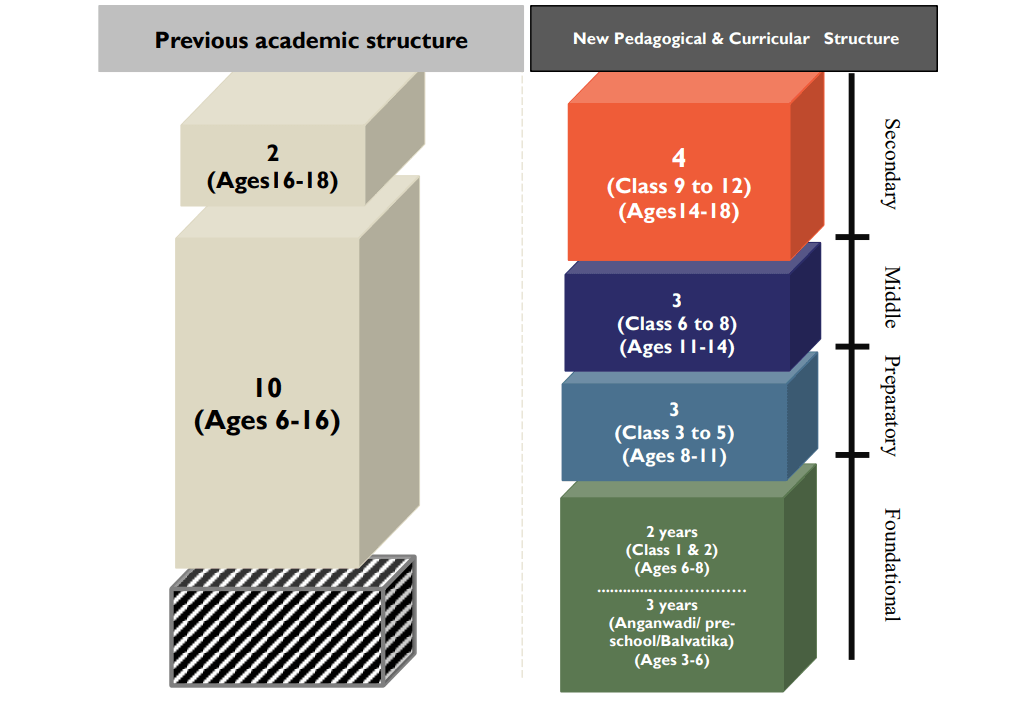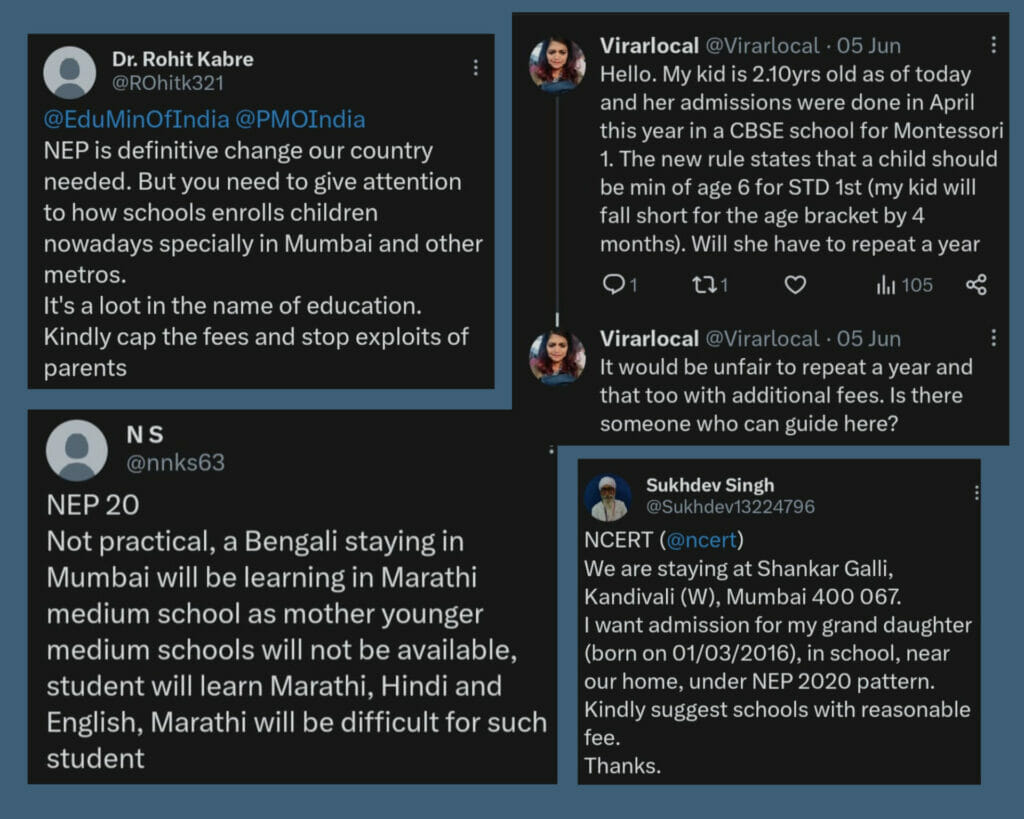Every year the new academic year begins June and July for most colleges. However, this year, it’s not the usual reopening of institutes. Students, parents as well as educators are busy understanding the possible implementation of the National Education Policy (NEP) in Mumbai. Much of this uncertainty and confusion is expected to clear up in the coming weeks.
As per the NEP 2020, schools must implement 5+3+3+4 years of education system. However, the Maharashtra State Board, announced that the 10th and 12th standard board exams i.e. the (10+2) system will continue till the academic year 2024-2025. This rules out any significant changes at the schooling level for the next two years.
On the other hand, the state higher education minister Chandrakant Patil, said that all universities will have to adhere to the NEP-recommended 4-year graduation policy by 2024 (if not already implemented). “Enough time will be given to universities to resolve queries from all stakeholders. Next year, no colleges can give any excuse for not implementing NEP,” he said at a press conference last week.
This year’s rollout
In Maharashtra, around 600 colleges — autonomous and those with PG departments — and 13 public universities will roll out the NEP this academic year. They will offer the four-year degree along with the existing three-year course. In Mumbai, 57 colleges, including St Xavier’s, Jai Hind, Mithibai and Ruia, will be offering the four-year programme.
A news report quoted Dr. Rajendra Shinde, the Principal of St Xavier’s College, saying that they were told that the course framework cannot exceed the total of 176 credits. So they have designed their courses accordingly, the college has made concept notes available on their website for various skill enhancement and open elective courses offered at their institution.
The NEP was expected to be mandatory for all higher education institutes from this academic year. However, the vice-chancellors of various universities in the state sought more time to prepare for it in a meeting with Chandrakant Patil.
For 100% NEP implementation in the state, all universities will have to draw out a plan by September, iron out the problems by December, and the policy will roll out from next year. “From January 1, 2024, six months before (the start of the academic year), the implementation plan can be announced,” Patil said at the press conference.
What is NEP?
The NEP introduced in 2020, replaces the 34-year-old National Policy on Education framed in 1986 and has been set to reform the school and higher education system of India. This policy proposes the revision and revamping of all aspects of the education structure, including its regulation and governance.
“The gap between the current state of learning outcomes and what is required must be bridged through major reforms that bring the highest quality, equity and integrity into the system, from early childhood care and education through higher education. The aim must be for India to have an education system by 2040 that is second to none, with equitable access to the highest-quality education for all learners regardless of social or economic background.” — NEP 2020:3
Read more: The problem of Mumbai’s ‘unrecognised’ schools. What are the solutions?
NEP for schools
This policy envisages that the 10+2 structure in school education will be modified with a new pedagogical and curricular restructuring of 5+3+3+4 covering ages 3-18.
Currently, children in the age group of 3-6 are not covered in the 10+2 structure as Class 1 begins at age 6. In the new 5+3+3+4 structure, a base of Early Childhood Care and Education (ECCE) from age 3 is included, which is aimed at promoting better overall learning, development, and well-being.
The curricular and pedagogical structure and the curricular framework for school education will therefore be guided by a 5+3+3+4 design, consisting of the Foundational Stage (in two parts, that is, 3 years of Anganwadi/pre-school + 2 years in primary school in Grades 1-2; both together covering ages 3-8), Preparatory Stage (Grades 3-5, covering ages 8-11), Middle Stage (Grades 6-8, covering ages 11-14), and Secondary Stage (Grades 9-12 in two phases, i.e., 9 and 10 in the first and 11 and 12 in the second, covering ages 14-18).
However, amid the uncertainty of the implementation of a 5+3+3+4 structure in schools this year, the Maharashtra State Board of Secondary and Higher Secondary Education chairperson Sharad Gosavi, last month stated that the 2023-24 batch of Class 10 and 12 students will take their board exams. “The state is in the process of adopting the NEP but it will not be not applicable in the academic year 2023-24,” he said.
Even after the declaration of the board exams, many students and parents are unsure of NEP. “Many parents are unaware of the concept and implementation of NEP, especially in schools. The government should send across a notice for mandatory orientation sessions for the parents along with their children at their respective schools, so that everyone is on the same page. Their queries should be answered and all this confusion should be avoided,” said Glen Rodriguez, parent of two children in Grade 5 and 7.

NEP for higher education: Universities and colleges
The NEP for higher education suggests a four-year undergraduate programme with multiple entry and exit options to the students, allowing certificate, diploma, and degree at the end of the first, second, and third year, respectively. It says that this shall allow “the opportunity to experience the full range of holistic and multidisciplinary education in addition to a focus on the chosen major and minors as per the choices of the student” (NEP 2020: 37).
NEP offers flexibility to the students, so that they choose their learning trajectories and programmes, and thereby choose their own paths in life according to their talents and interests. There will be no hard separation between the arts and sciences, between curricular and extra-curricular activities, between vocational and academic streams, etc. in order to eliminate harmful hierarchies among different areas of learning.
The policy focuses on regular formative assessment (ongoing feedback to students while they are learning) rather than the summative assessment (examinations) that encourages today’s ‘coaching culture’.
Confusion and concerns over age limit
Concerns over adverse impact on the quality of a four-year undergraduate programme are rife as many universities have adopted the programme without adequate preparation or training of the educators.

Also, some recruiters have flagged the possibility of confusion among students and hiring companies due to the multiple entry and exit options in the degree structures.
But before that can be addressed, it is the admissions and completion of school education that has parents of young children worried.
School authorities are in the process of issuing various guidelines for this and the next academic year. Next few weeks and months of the current academic year are likely to be chaotic and stressful for both educators and students.